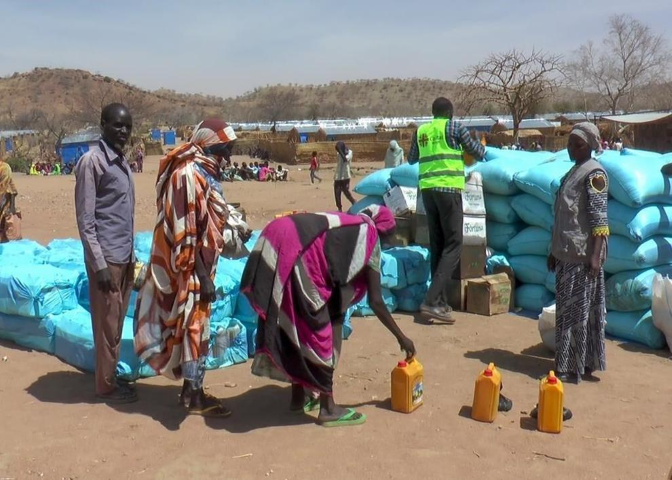
Sudanese refugees displaced by the conflict in Sudan gather to receive food staples from aid agencies at the Metche Camp in eastern Chad Tuesday, March 5, 2024. As the civil war in Sudan enters its second year, Canada is announcing sanctions on people and companies perpetuating the conflict. THE CANADIAN PRESS
In Ottawa, the Canadian government implemented sanctions on Monday against individuals it holds responsible for perpetuating a year-long civil conflict in Sudan, while the country's former ambassador to Canada, Tarig Abusalih, emphasized Canada's potential role in facilitating peace efforts.
Abusalih expressed deep concern over the crisis in Sudan, characterizing it as a catastrophic situation that demands global attention. The conflict erupted a year ago amid political tensions within Sudan's military, leading to widespread violence and triggering what the United Nations describes as the largest internal displacement crisis worldwide.
The Rapid Support Forces, a paramilitary group, has been accused of atrocities reminiscent of the Darfur genocide, while the Sudanese Armed Forces have also been implicated in acts of violence. External actors, including the United Arab Emirates, Iran, and Russia, are alleged to have provided financial support and weapons to the conflicting parties, with reports indicating the use of long-distance drones in the conflict.
A report released by the Raoul Wallenberg Centre for Human Rights based in Montreal presents evidence suggesting ongoing genocide in Sudan, documenting massacres, sexual violence, and targeted executions along ethnic lines.
Canada's engagement with the crisis dates back to its onset, with Prime Minister Justin Trudeau meeting Abusalih on the day the conflict erupted. Foreign Affairs Minister Mélanie Joly visited Kenya to discuss regional strategies for peace in Sudan, and Canada allocated humanitarian aid to the region. Despite initial efforts, there was a noticeable lull in Canadian action until recently.
After months of relative inactivity, Canada announced sanctions targeting individuals and entities deemed to be undermining peace and stability in Sudan. Notable figures sanctioned include paramilitary commander Abdelrahim Hamdan Dagalo and former foreign minister Ali Karti. Additionally, four companies allegedly supporting the warring factions are also facing sanctions.
The move has been met with mixed reactions, with critics lamenting the delay and urging more substantial action from the Canadian government. However, Abusalih acknowledged Canada's previous aid contributions and called for continued international support to address the urgent humanitarian needs in Sudan, including food shortages, lack of medical supplies, and ongoing violence in displaced persons camps.
Abusalih resigned from Sudan's foreign service amid the conflict, emphasizing the need for a transition plan in post-conflict Sudan that involves non-partisan experts managing the country until democratic elections can be held. He emphasized the importance of international cooperation in ending the conflict and called for an international conference for Sudan's reconstruction once peace is achieved.
Despite Canada's humanitarian efforts, challenges remain, notably in reuniting families separated by the conflict. While a program was announced to facilitate the reunion of families fleeing Sudan with relatives in Canada, implementation hurdles and delays have hindered its effectiveness. Abusalih urged Canada to expedite the program and rally international support to halt the ongoing violence in Sudan, emphasizing the collective toll it takes on the Sudanese people.















